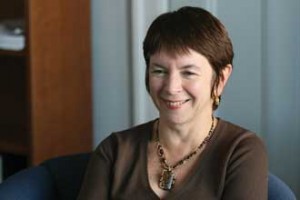
By Chris Chipello
At the McGill School of Social Work, classroom instruction and grassroots community involvement go hand in hand.
Every year, some 300 or so students from the School reach out to help: at CLSCs, rehab centres and homeless missions across Montreal; in aboriginal communities elsewhere in Quebec; and, increasingly, in far-flung international settings, from the Middle East to Mumbai.
“Our students acquire 40 per cent of their credits through field placements, working in agencies in the community,” said Wendy Thomson, the School’s director.
High-priority projects currently include building social-work capacity in Quebec aboriginal communities, helping to strengthen black families in Montreal, development of a new Master’s program in couple and family therapy, and a variety of initiatives to help children in need.
The School’s Indigenous Access McGill program helps recruit and support aboriginal students in the Bachelor’s and Master’s degree programs. The IAM support has helped to ensure that no aboriginal students have dropped out.
In the 14 local villages in northern Quebec’s Nunavik region, where the School has been active for more than two decades, it is currently exploring the feasibility of a community-based Bachelor’s degree in Social Work. “People from Nunavik don’t want to come down here to study for their full program,” Thomson said, “But they are very interested in continuing professional development and some want to see McGill offer a community-based degree.”
“Our commitment to developing capacity, working with aboriginal communities through social-work, education is one of the ways forward with the First Nations. The times are passed when white people did things ‘for’ native people.”
Within Montreal, the School is collaborating with the English-speaking black community in a prevention project that aims to strengthen families. For many years black children have been disproportionately represented in the youth-protection system. The current project has brought together a number of black organizations in Montreal to train parents and build support networks to help families raise their children. The McGill Centre for Research on Children and Families was involved in an initial evaluation of the
project, and the School is looking to develop a special student-placement module with the project.
More broadly, the School has a long-established expertise in family therapy, through its affiliation with the Institute of Psychiatry at the Jewish General Hospital, where McGill students are trained. The Quebec government recently established a new professional title recognizing couple and family therapists, and McGill is the first university in the province to develop and seek approval for a Masters program in this specialty.
The Domestic Violence Clinic, based within the School, serves as a centre for student placements and research on interventions with problems of domestic violence.
In the area of children’s services, for many years the School has collaborated closely with the Batshaw Youth and Family Centres, a Centre de la jeunesse that is part of the Quebec Health and Social Services network.
Thomson, herself, has recently taken on a major role in an initiative to improve the child welfare system in Ontario. In late November, the Ontario Ministry of Children and Youth Services named her one of three members of an independent commission – and the only member from outside the province – to develop ways to make services more financially sustainable, while protecting children and improving their outcomes through evidence-based practices.
Thomson, who grew up in Montreal, earned a reputation for improving social services in the U.K., where she served as Prime Minister Tony Blair’s chief adviser on public-service reform from 2001 to 2005. She has also advised governments in Ghana, Nigeria and New Brunswick.
